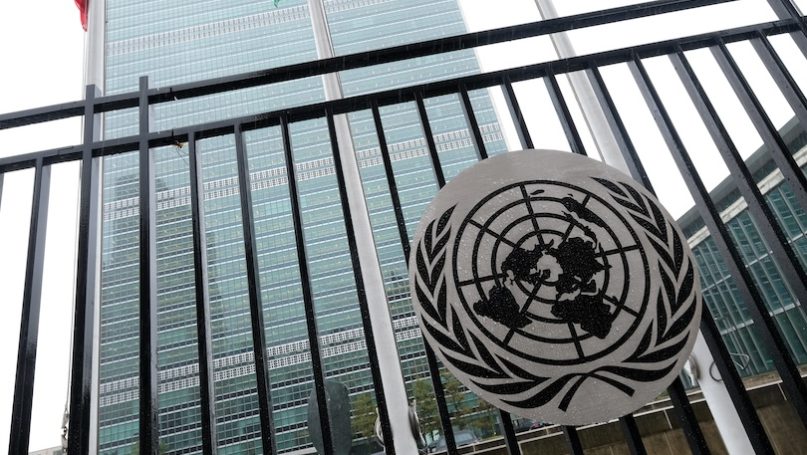
This case study is an excerpt from McGlinchey, Stephen. 2022. Foundations of International Relations (London: Bloomsbury).
From a theoretical point of view, the effectiveness and utility of the United Nations differs depending on which perspective we choose to adopt. Liberals tend to have faith in the capacity of international organisations, primarily the United Nations, to uphold the framework of global governance. Such organisations may not be perfect, but they help the world find alternatives to war through trade and diplomacy (among other things), which are staples of the liberal account. Realists, although they do not reject the United Nations completely, argue that states will eventually resort to war despite the efforts of international organisations, which have little real authority. Generally, realists believe that international organisations appear to be successful when they are working in the interests of powerful states. But, if that condition is reversed and an organisation becomes an obstacle to national interests, then the equation may change. This line of enquiry is often used by realists to help explain why the League of Nations was unsuccessful – failing to allow for Germany and Japan’s expansionist desires in the 1930s, so both states left the League and invaded their neighbours.
On the other hand, constructivists see organisations like the United Nations as places where they can study the emergence of new norms and examine the activities of those who are spreading new ideas. If we can once more briefly recall the United States’ decision to invade Iraq in 2003, constructivism would highlight that while it is true that a powerful state ignored the United Nations in pursuit of its own self-interest (as a realist would describe it), by doing so it violated the standard practices of international relations. To use constructivist language, the United States disregarded a ‘norm’ by invading Iraq illegally (via international law) and even though there was no direct punishment, its behaviour was irregular and so would not be without consequence. Examining the difficulties the United States faced in its diplomatic relations after 2003, and the major shifts in its policymaking thereafter (including reluctantly, at first, joining multilateral discussions with Iran as mentioned in earlier), gives considerable weight to this insight.
Constructivists study the emergence of norms at the United Nations, attempting to track and understand the process of how our world order is under constant change through the actions of individuals, groups and states pursuing different agendas. An example is Palestine, which is currently an observer state at the United Nations since it is not (yet) considered sovereign as it is presently part of the state of Israel. The United Nations does not have the power to rule otherwise by itself, nor do pro-Palestinian statehood activists and supporters who have been advocating for Palestinian secession from Israel for decades. To recall the benchmarks for sovereignty from chapter two, Palestine has both internal and external challenges to its quest for statehood.
Looking deeper, this case allows us to consider the path that norms take and the importance of the United Nations as the centre stage of that process. There are three steps in the ‘norm lifecycle’ (Finnemore and Sikkink 1998): emergence, cascade and internalisation. In the case of Palestine, we have seen norm emergence as the idea of statehood is clearly active as a project. We can also see the cascade as over two thirds of the world’s states have come to accept Palestinian statehood, causing a growing expectation for others to do the same. Importantly, this pressure is most visible in international arenas such as the United Nations. Despite this cascade, there are still powerful states who are resisting, most notably Israel and the United States. For Palestine to become a sovereign state it will need to overcome this resistance, allowing the norm to become internalised, and thereby complete the cycle. Should this occur, accepting Palestinian statehood would become an expected behaviour, one that became natural. When norms reach this stage, you can usually also recognise instruments/effects that serve to make them tangible. For example, if Palestine reaches statehood, we would see legal documents and physical elements agreed at the United Nations – such as internationally recognised borders – and material symbols of Palestine’s existence (flags, nameplates, permanent staff etc.) permanently appearing alongside, and equal to, those of other states.
In this sense, constructivism adds layers to our understanding of how socially constructed elements of our system, such as sovereignty, works in practice. Of course, not all norms make it all the way to internalisation. Some come apart along the way if the case is not sufficiently well supported. So, it is unclear at this stage what lies ahead in Palestine’s quest for statehood. What is clear is that constructivism gives us unique tools to detect, and to understand, this process as one that plays out internationally – with the United Nations as the centre stage. And, it helps to lock in the realisation that all the features of our political world, including the existence of the United Nations itself, were once just an idea that subsequently went through the norm lifecycle and earned its place as a tangible part of our global system. It also should be clear that understanding this process is to understand that nothing political is forever, one day the United Nations itself may not exist if another idea supplants it. Ideas are always under contestation, development, debate and renewal.
Further Reading on E-International Relations
- Constructivism
- Student Feature – Theory in Action: Constructivism and Bhutan’s National Interests
- Postcolonialism, Feminism and the United Nations
- The United Nations Environment Programme in Nairobi, Kenya
- Student Feature – Spotlight on The United Nations Security Council
- Gun Violence in the United States